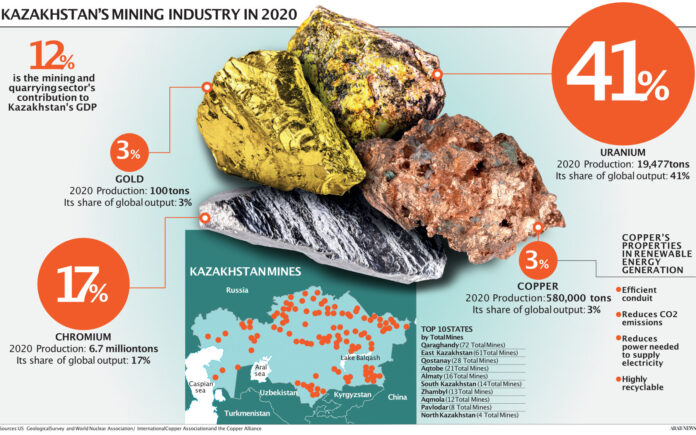CAIRO: Kazakhstan’s attendance at next week’s Future Mineral Forum in Saudi Arabia is looking increasingly unlikely following the protests sweeping the nation — just as the country is on the cusp of exploiting a growing demand for the copper reserves it has below its surface.
The demonstrations — sparked by a dramatic rise in car fuel prices — led Kazakhstan’s president Kassym-Jomart Tokayev to dismiss the entire government before issuing a state of emergency.
As such, there is likely to be an empty chair at the Forum set to begin on Jan. 11 in Riyadh.
If there is a Kazakhstan absence from the three-day event, it will be a missed opportunity for the country to explore business opportunities in its minerals reservoir, namely in copper mining.
Compared to conventional energy sources, renewable energy generation is much more copper intensive, providing multiple opportunities to KAZ Minerals — one of the largest copper producers in Kazakhstan.
With an ever-increasing shift toward renewable energy, it seems that copper extraction is set for an upswing, and KAZ Minerals is welcoming this development.
In 2020, Kazakhstan was the world’s second largest producer of chromium with a global share of 16.8 percent and an output of 6.7 million tons. (Supplied)
The Central Asian republic, a country with a wealthy stock of minerals, boosted its copper production by a yearly 3.2 percent to 580,000 tons in 2020, or around 3 percent of global output, according to estimates by the US Geological Survey.
KAZ Minerals was solely respon- sible for the production of 306,000 tons during the year, with production mainly deriving from the Aktogay and Bozshakol mines, together making up 253,200 tons of the company’s total supply.
Copper is a very efficient conduit, making it well-placed for renewable energy generation from solar, hydro, thermal and wind energy sources, according to the International Copper Association and the Copper Alliance.
The metal also aids in reducing CO2 emissions and the power needed to supply electricity. In addition, it is a highly recyclable material, cementing its place as one of the leading renewable resources, the organization added.
“Increasing penetration of renewables in the energy mix and carbon neutrality targets announced by various countries augur well for copper-intensive green end-use sectors,” Wood Mackenzie — a global energy research and consultancy — was cited by KAZ Minerals in its website.
However, it’s not only copper that is in abundance in the former Soviet republic; the country is a large supplier of many other minerals. This is shown through the sizable share of the mining and quarrying sector in Kazakhstan’s gross domestic product, making up 12.2 percent of output in 2020, official data revealed.
In 2020, Kazakhstan was the world’s second largest producer of chromium with a global share of 16.8 percent and an output of 6.7 million tons, estimated data from the US Geological Survey showed. The country also had the biggest known reserves of the mineral, standing at 230 million tons.
The world’s largest landlocked country was also a major extractor of gold, as it produced 100 tons of the commodity in 2020. This is compared to China, the world’s top supplier, which had an output of 380 tons, the Virginia-based organization said.
Moreover, Kazakhstan has 12 percent of the world’s uranium resources and produced 43 percent of the metal’s global output in 2020, according to the World Nuclear Association.
It is also one of the top producers of lead, manganese, zinc and iron ore, among others.
Kazakhstan is seeking to attract private investment in the mining sector, despite government and state-owned firms’ ability to finance the sector’s projects, GRATA International, an international law firm, said.
This is why the country entered several international and bilateral investment treaties. It also established the Astana International Financial Center — where disputes may be resolved under common law principles.
With the exception of uranium, Kazakhstan doesn’t impose restrictions on foreign investments in the exploration and mining sector related to solid minerals, except for artisanal mining licenses issued to Kazakh citizens only.

